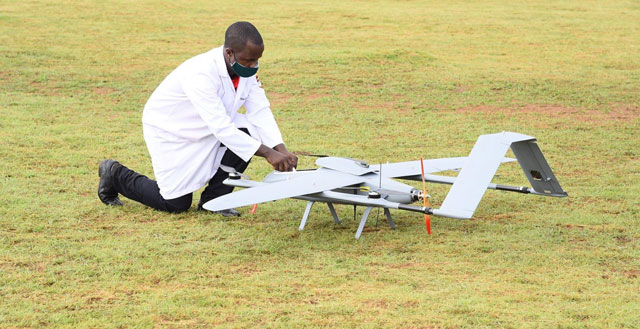
Kalangala, Uganda | THE INDEPENDENT | The Infectious Diseases Institute (IDI) has started delivering HIV drug refills to people in the Island areas of Kalangala district using medical drones.
The delivery will start in Bufumira Islands as a project that will assess the effectiveness of using the technology to deliver medicines and other supplies during health emergencies.
Rosalind Parkes Ratanshi, the Director of the Academy for Health Innovation that is heading the project says they are beginning with Kalangala this month but will also be extending to the West Nile region in the coming months.
With 84 islands, the Ministry of Health figures indicates that Kalangala is one of the districts with very high rates of HIV and teenage pregnancy than most of the country. According to figures, almost 50 percent of teenage girls in the district are mothers and 18 percent of adults have HIV whereby both rates are two to three times higher than the rest of Uganda.
Dr Andrew Kambugu, the IDI Executive Director says with high rates of HIV in this area, they are also faced with acute challenges of accessing Antiretroviral drugs (ARVs) which as a result forced many of them not to adhere to drugs, which affects their ability to suppress the virus and eventually limit transmission.
Kambugu says that for each drone, they spent $30,000 and will be carrying drugs for five to fifteen people per trip.
Parkes says to eliminate the need for lots of people to move to where the drone will be dropping the medicines, they have resolved to work with peer leaders who will pick the refills and distribute them to colleagues in the same group. Each person will be getting three months of refills.
While the use of medical drones is being touted as a game-changer in access to health supplies especially in times of emergencies and for hard to reach areas as Parkes says once the drone is bought all they will need are batteries to run it.
The Ministry of Health says before complete uptake, they need to evaluate to see whether they are cost-effective and can do journeys longer than the 10Kms current pilot.
Dr Henry Mwebesa, the Director-General of Health Services says while the idea of the drones would have come in handy at the height of the COVID-19 crisis, they had not yet conceptualized the idea to see whether it’s cost-effective and can go longer distances.
Now, he says, depending on the results of this project, they will deploy drones to cover emergencies including availing blood and other sundries needed in health emergencies.
*******
URN
 The Independent Uganda: You get the Truth we Pay the Price
The Independent Uganda: You get the Truth we Pay the Price



